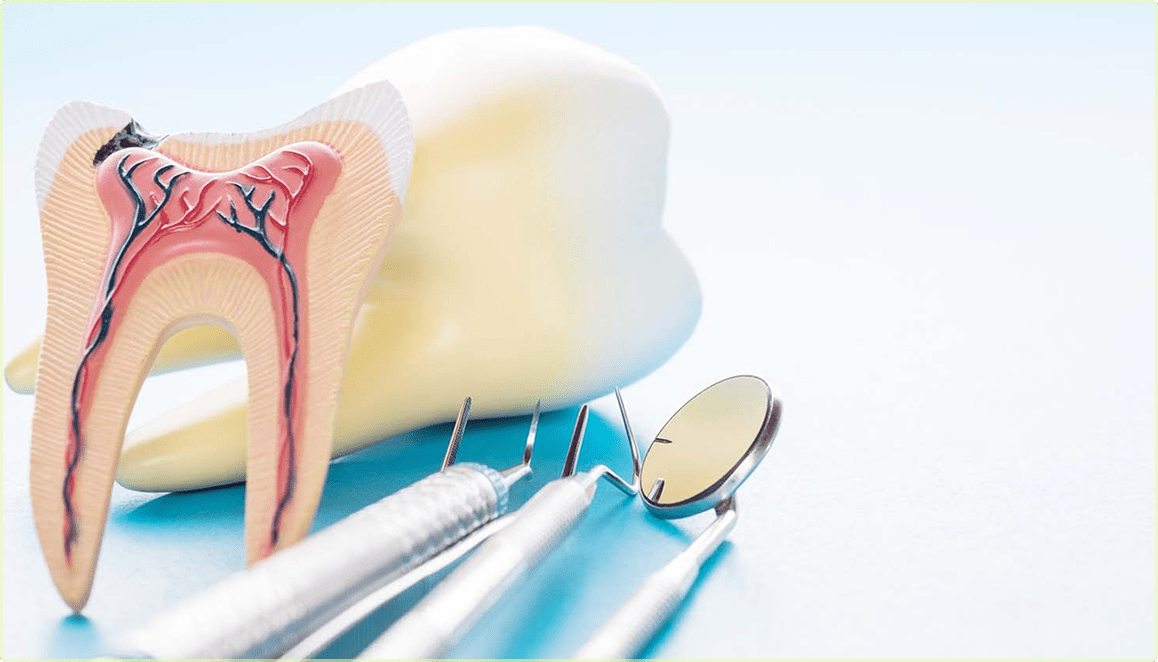Now Reading: How You Can Stop Tooth Nerve Pain at Home
-
01
How You Can Stop Tooth Nerve Pain at Home
How You Can Stop Tooth Nerve Pain at Home

Tooth nerve pain can strike when you least expect it, turning a regular day into a painful ordeal. It’s sharp, relentless, and can make even the simplest tasks feel unbearable.
If you’ve ever experienced this, you know how crucial it is to find relief—and fast. But before you reach for the phone to call your dentist, there are effective methods you can try right at home. Imagine easing that throbbing pain without leaving your house, using simple remedies that you probably already have on hand.
Are you ready to discover how you can stop tooth nerve pain and regain control over your day? Let’s dive into the solutions that could bring you the comfort you desperately need.
Home Remedies For Relief
Tooth nerve pain can be a real bother, making daily activities a challenge. But there are ways to find relief without leaving your home. Home remedies can offer a simple and effective solution to manage this discomfort. These remedies are often natural, cost-effective, and easy to use. Below, explore some of the best home remedies to soothe tooth nerve pain.
Salt Water Rinse
Using a salt water rinse is a classic remedy for tooth pain. It’s easy and uses ingredients found in most kitchens. Salt water acts as a natural disinfectant. It can help reduce inflammation and heal oral wounds.
Here’s how to make a salt water rinse:
- Mix 1 teaspoon of salt into a glass of warm water.
- Stir until the salt dissolves completely.
- Swish the solution around your mouth for 30 seconds.
- Spit it out. Do not swallow.
Repeat this process up to three times a day. This can help reduce pain and swelling. Salt water is also beneficial in removing bacteria from the mouth. This can prevent further infection.
Pros:
| Benefits | Description |
| Anti-inflammatory | Helps reduce swelling and pain. |
| Disinfectant | Keeps the mouth clean and free from bacteria. |
Cold Compress
A cold compress can provide quick pain relief. It works by numbing the area and reducing swelling. Cold therapy is effective for various types of pain, including tooth nerve pain.
To apply a cold compress:
- Wrap some ice cubes in a clean cloth.
- Hold the compress against the affected area for 15-20 minutes.
- Remove it and wait for a few minutes before reapplying.
Repeat this every few hours. Avoid placing ice directly on the skin. It can cause frostbite or irritation.
Benefits of Cold Compress:
- Reduces swelling by constricting blood vessels.
- Offers immediate pain relief.
- Simple and requires no special equipment.
Clove Oil Application
Clove oil is a powerful remedy for tooth nerve pain. It has been used for centuries due to its natural analgesic properties. Clove oil contains eugenol, a natural anesthetic that numbs pain.
Follow these steps to use clove oil:
- Dip a cotton ball in clove oil.
- Apply it to the affected area gently.
- Leave it on for about 10-15 minutes.
Use clove oil up to twice a day. Ensure not to ingest the oil as it can be strong.
Advantages of Clove Oil:
- Natural pain relief due to its anesthetic properties.
- Anti-inflammatory, helping reduce swelling.
- Antibacterial, preventing infection.
These simple remedies can help ease your tooth nerve pain effectively. Always consult a dentist if pain persists.
Natural Pain Relievers
Tooth nerve pain can be a bothersome experience, disrupting daily activities and causing discomfort. While professional dental care is essential, natural pain relievers can offer temporary relief and soothe the aching nerves right at home. These remedies are simple, accessible, and effective, using ingredients found in most kitchens. Discover how peppermint tea, garlic clove, and turmeric paste can ease your tooth nerve pain naturally.
Peppermint Tea
Peppermint tea is not just a refreshing drink; it also has natural analgesic properties. The cooling effect of peppermint can numb the pain and provide a soothing sensation to the affected area. Here’s how you can use peppermint tea for tooth nerve pain:
- Brew a strong cup: Use fresh or dried peppermint leaves. Let them steep in hot water for 10 minutes.
- Cool the tea: Allow the tea to cool to room temperature.
- Rinse your mouth: Swish the cooled tea around your mouth, focusing on the painful area.
- Repeat: Use this rinse several times a day for relief.
Peppermint contains menthol, which has anti-inflammatory and antibacterial properties. These benefits aid in reducing swelling and preventing infection. Drinking peppermint tea regularly can also contribute to overall oral health. It’s a gentle yet effective way to manage tooth nerve pain at home.
Garlic Clove
Garlic is a powerful natural remedy known for its antibacterial properties. It can help alleviate tooth nerve pain by fighting infection and reducing inflammation. Here’s a simple method to use garlic for tooth pain:
- Crush a garlic clove: Release the juices by crushing it gently.
- Apply directly: Place the crushed clove on the affected tooth.
- Leave it for a few minutes: Allow the garlic to work on the pain.
- Rinse your mouth: Use warm water to rinse after removing the garlic.
Garlic contains allicin, an active compound that acts as a natural antibiotic. This helps in reducing bacterial growth around the painful area. For those sensitive to the taste, mixing crushed garlic with a bit of salt can enhance its efficacy and make it easier to apply. Regular use can help in managing discomfort effectively.
Turmeric Paste
Turmeric is a renowned spice with potent anti-inflammatory and antimicrobial properties. It can be used to create a paste that offers relief from tooth nerve pain. Here’s how you can make and use turmeric paste:
- Mix turmeric powder: Combine a teaspoon of turmeric with a small amount of water to form a paste.
- Apply to the affected area: Use a cotton ball or your finger to apply the paste directly.
- Let it sit: Leave the paste on for about 10 minutes.
- Rinse thoroughly: Use warm water to rinse your mouth afterward.
The active ingredient in turmeric, curcumin, provides relief by reducing inflammation and soothing the nerves. Turmeric paste not only helps in alleviating pain but also supports oral health by preventing bacterial infections. This simple remedy is a great addition to your home care routine.
Over-the-counter Options
Tooth nerve pain can be both annoying and distressing. Relief is often sought immediately to manage discomfort. Thankfully, there are various over-the-counter options available that can help ease the pain at home. These solutions provide quick, effective relief, allowing you to continue your daily activities without interruption. Let’s explore some popular choices that can help manage tooth nerve pain.
Pain Relief Medications
Over-the-counter pain relief medications are a common choice for tooth nerve pain. They offer quick relief and are easily accessible. Here are some options:
- Ibuprofen: Reduces inflammation and pain. Take as directed on the packaging.
- Acetaminophen: Offers pain relief but doesn’t target inflammation.
- Aspirin: Known for its anti-inflammatory properties. Use with caution if you have bleeding disorders.
These medications come in different forms such as tablets and capsules. It’s vital to follow the recommended dosage to avoid side effects. Check the table below for dosage guidelines:
| Medication | Dosage (Adults) |
| Ibuprofen | 200-400 mg every 4-6 hours |
| Acetaminophen | 500-1000 mg every 4-6 hours |
| Aspirin | 325-650 mg every 4-6 hours |
Always consult with a healthcare provider before starting any medication, especially if you have existing health conditions or allergies.
Topical Anesthetics
Topical anesthetics provide localized relief by numbing the affected area. They’re easy to apply and act quickly. Popular choices include:
- Benzocaine Gel: Apply directly to the gums. Provides fast relief for minor tooth pain.
- Lidocaine Ointment: Often used for dental procedures. Effective for short-term relief.
- Eugenol: Derived from clove oil. Natural option known for its soothing properties.
These products are usually applied using a cotton swab or your fingertip. Ensure hands are clean to prevent infection. Follow these steps for application:
- Wash hands thoroughly.
- Apply a small amount of gel or ointment to the painful area.
- Wait a few minutes for the anesthetic to take effect.
- Reapply as needed, following the product instructions.
Using topical anesthetics can provide temporary relief from tooth nerve pain, allowing you to manage discomfort until professional dental care is available.
Preventive Measures
Tooth nerve pain can be incredibly disruptive. It affects your daily activities and your overall well-being. While there are various remedies available, focusing on preventive measures can help you avoid the pain altogether. Implementing simple practices at home might keep tooth nerve pain at bay. By maintaining proper oral hygiene and making mindful dietary choices, you can protect your teeth and gums effectively.
Oral Hygiene Practices
Maintaining good oral hygiene is vital for preventing tooth nerve pain. Regular cleaning keeps bacteria at bay and reduces the risk of inflammation. Here are some essential practices:
- Brush Twice Daily: Use a soft-bristled toothbrush to clean your teeth. Do this at least twice a day. Pay attention to the gum line to remove food particles.
- Floss Daily: Flossing helps in removing debris between teeth. This prevents plaque buildup and reduces the risk of gum disease.
- Use an Antibacterial Mouthwash: Rinse your mouth with an antibacterial mouthwash. It kills bacteria that can lead to infections.
Consider using fluoride toothpaste, as it strengthens tooth enamel and prevents decay. Here’s a simple table on recommended oral hygiene tools:
| Tool | Purpose |
| Soft-bristled Toothbrush | Gentle cleaning and gum protection |
| Dental Floss | Removes debris between teeth |
| Antibacterial Mouthwash | Kills harmful bacteria |
Dietary Adjustments
What you eat affects your dental health significantly. Making smart dietary choices can help prevent tooth nerve pain. Consider the following adjustments:
- Limit Sugar Intake: Sugary foods and drinks lead to tooth decay. Reducing sugar can lower the risk of cavities.
- Include Calcium-rich Foods: Foods like cheese and yogurt strengthen teeth. They provide essential minerals that maintain tooth health.
- Stay Hydrated: Drinking plenty of water helps. It washes away food particles and keeps your mouth clean.
- Avoid Acidic Foods: Foods like citrus fruits can erode enamel. Limit their intake to protect your teeth.
Making these dietary changes can significantly impact your dental health. Choose whole fruits over juices. They contain less sugar and are better for your teeth. Mindful eating practices can support your efforts to prevent tooth nerve pain.
When To Seek Professional Help

Tooth nerve pain can be a sharp, unbearable sensation. It often disrupts daily life. While home remedies may offer temporary relief, knowing when to seek professional help is crucial. Ignoring severe pain might lead to more serious dental issues. This guide will help you understand when it’s time to consult a dentist.
Persistent Pain
Persistent tooth pain that lasts more than a day or two can be a sign of a serious problem. If over-the-counter painkillers do not help, visit your dentist. They can diagnose the underlying issue.
Swelling
Swelling around the tooth or gums is a red flag. This could indicate an infection. Infections can spread quickly, causing more harm. A dentist’s intervention is necessary to prevent complications.
Fever
Experiencing a fever alongside tooth pain can be alarming. A fever suggests an infection that the body is trying to fight. Professional dental care is needed to address the root cause.
Difficulty Eating Or Talking
Struggling to eat or speak because of tooth pain is not normal. This often means the pain is severe. A dentist can provide solutions to restore comfort and function.
Bleeding Gums
Bleeding gums, especially with pain, can signal gum disease. Gum disease requires professional treatment to prevent tooth loss. It’s important to address this issue promptly.
Sensitivity To Hot Or Cold
Extreme sensitivity to hot or cold foods can indicate nerve damage. If sensitivity persists, it might be more than just a minor issue. Seek a dentist’s advice for a thorough examination.
Previous Dental Work
If you’ve had previous dental work and experience new pain, consult your dentist. New pain may suggest complications with fillings or crowns. Professional assessment can determine if adjustments are needed.
| Symptom | Action |
| Persistent Pain | Consult Dentist |
| Swelling | Seek Immediate Help |
| Fever | Visit Dentist |
| Difficulty Eating | Schedule Appointment |
| Bleeding Gums | Get Professional Care |
| Sensitivity | Have a Check-Up |
| Previous Dental Work | Revisit Dentist |
Frequently Asked Questions
How Can I Stop Nerve Tooth Pain Fast At Home?
Rinse your mouth with warm salt water to reduce inflammation. Apply a cold compress to your cheek. Use clove oil for its numbing effect. Take over-the-counter pain relievers like ibuprofen. Avoid very hot or cold foods and drinks. Consult a dentist if pain persists.
How Can I Numb The Nerve In My Tooth?
To numb a tooth nerve, use over-the-counter pain relief gels or clove oil. Apply directly to the affected area. Cold compresses can reduce swelling and numb pain. Visit a dentist for professional advice and treatment. Avoid consuming hot or cold foods to prevent aggravating the nerve.
What Is The Strongest Pain Relief For Toothache?
The strongest pain relief for toothache often includes over-the-counter medications like ibuprofen or acetaminophen. For severe pain, dentists may prescribe stronger medications. Clove oil can provide temporary relief. Always consult a dentist for persistent pain.
What Drink Gets Rid Of Toothache?
Clove tea can help relieve toothache due to its anti-inflammatory properties. Peppermint tea may also offer soothing effects. Always consult a dentist for persistent pain.
Conclusion
Tooth nerve pain can be tough. Home remedies offer quick relief. Simple steps help soothe discomfort. Rinse with warm salt water. Apply a cold compress. Try clove oil for pain relief. Ginger tea calms nerves too. Maintain good oral hygiene.
Brush gently to avoid irritation. Regular flossing is crucial. These methods provide comfort. Consult a dentist if pain persists. Professional help ensures proper care. Healthy habits prevent future issues. Prioritize dental health. Stay pain-free and enjoy life.
you can also read more blog post























Pingback: F1 Results: Unveiling the Latest Race Highlights & Surprises